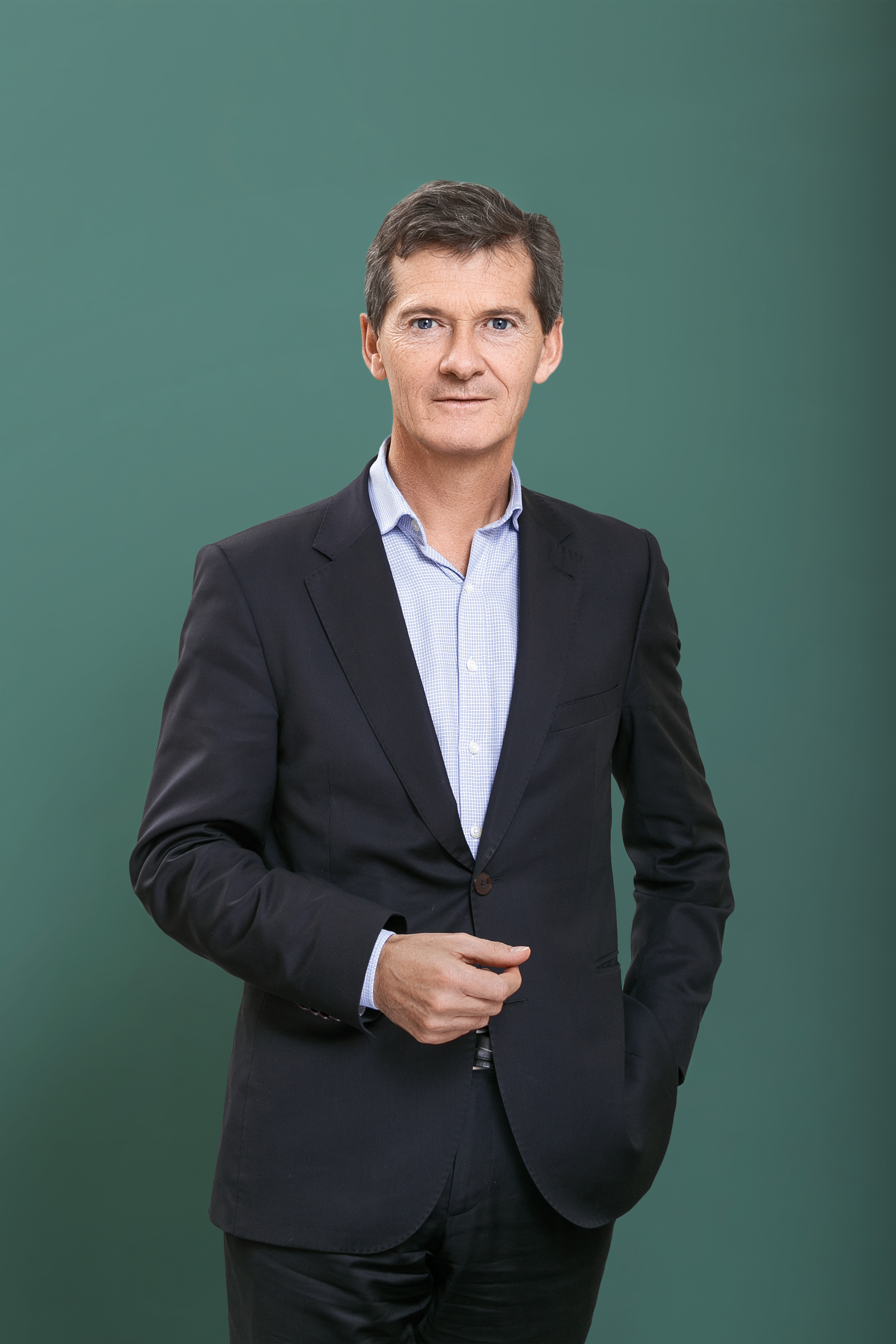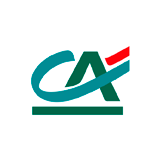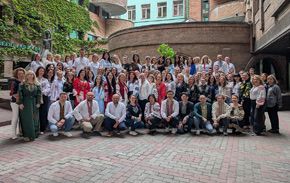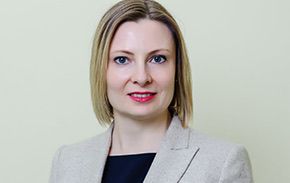Banker.ua magazine December 2021
Carlos de Cordoue devoted more than 30 years to the French bank Credit Agricole. He chaired the representation office in Serbia, worked in its structure in, France, and was General Manager of Credit Agricole units in Hong Kong, and Thailand. In April 2020, almost with the start of the pandemic, Carlos de Cordoue was appointed to the new responsible banking position – the CEO, this time in Ukraine. In the exclusive interview to the Banker, he told how the bank faces the pandemic challenges, which new services and products it offers (in particular, in the agrisector) and what its advantages are compared to the competitors.
Since the start of the pandemic, the situation in the banking sector is seen by many bankers and their clients as nervous. Given the current situation, did you manage to adapt to the new environment? What changed in your bank as a result of the pandemic?

We adapted to the pandemic extremely quickly: we organized the remote work system almost immediately, and in 3 weeks, the bank was fully functional. So, I cannot say that the working process was disrupted. Not only us, but the economic system in Ukraine adapted rather quickly. However, with each new COVID-19 wave we need new ways of adaptation. Currently, we observe a slow-down in consumption. This has a direct impact on our activity (fewer cars are sold, and we finance their purchase less). In other words, the consequences of the pandemic are bigger risk factors than the pandemic itself. The current energy crisis is a problem as well. Another global problem occurred as a result of the pandemic is logistics, deficit of semi-conductors (which makes it difficult to buy a car).
The pandemic caused numerous changes in the work methods of the bank. Now we work in a “flexible office”: employees come to the office in turns and thus, we managed to save 20% of the working space. In terms of clients, at the end of 2019, we launched a mobile application СА+. We immediately saw an unexpected increase of the number of mobile transactions of all types (card-to-card transfers, various payments). Payments with debit cards Master Card і Visa doubled. Thus, due to the pandemic, our clients switched to cashless payments. I used to pay in cash myself but I no longer do it.
What can become the source of the Ukrainian banking sector growth? Which trends of its development you see for 2022?
IT sector is very powerful in Ukraine, it develops quickly. Last year, it added 35% to the export. Local IT specialists do not need to go to Europe of the US. They can work from here – for Google, Amazon. Their purchasing power is high already and it will grow. This is a driving force for Ukraine as they will be the consumers who need housing, cars, etc.
I am positive about the future of the banking system in Ukraine. If we consider the size of the lending market, there is a huge space for maneuver. Compared to Poland, this market is small. And the mortgage market is tiny. Growth potential in Ukraine is unlimited but this growth will be gradual.
You compared us with Poland. Could you give any precise numbers on mortgage and other lending?
For example, in Ukraine the ratio of mortgage loans to GDP in 2020 was less than 1%, while in Poland it is 22%. But I always tell to my team when we develop the strategy of the bank and make forecasts: it should be understood that Ukraine will reach the indicators of Poland in some 15 years. As it is now, Credit Agricole mortgage portfolio is over UAH 150 million, which is a quarter more than last year.
We approached loans. How is the loan portfolio of the bank structured now? By how much do you plan to increase it in 2022 (tools)?
This year, our loan portfolio will increase by 25-30%. This was not a standard situation for us: we did not expect it. Big lending in agrarian sector was unexpected for us. Thanks to good yields, this year agrarians required funds for purchase of the new equipment, harvest storage, and they actively borrowed money. Private consumption increased as well since private individuals consume more. As a result, loans to individuals increased materially.
Our strategic plan provides for loan portfolio increase by about 15% per year, and this is our support to the Ukrainian economy. We are interested in retail lending as we see that lending potential of private individuals is high (mortgage, car lending, credit cards). I think that we could grow by 20% per year in this segment.
You mentioned mortgage and car lending. These products are gradually resumed in Ukraine, and Credit Agricole is also represented in this segment. Do you believe in recovery of these niches that used to generate a good profit for banks (before 2008)?
If we talk about the times before 2008, a large portion of mortgage loans were denominated in foreign currencies. Borrowers were looking for low interest rates but they were badly hit by devaluation of UAH.
Nowadays, people are more cautious, not to say reluctant to be indebted on the long term. We surveyed young people and asked if they are ready to acquire housing using mortgage loan. Most of them prefer to accumulate sufficient saving in the account and buy afterwards. They will contact bank only when they need to finance refurbishment of the kitchen or other small home improvement project.
However, the perception of mortgage in Ukraine will change in time. We think that this market has a big potential and will be growing when interest rate will decrease.
What interest rates you consider adequate for Ukraine?
Interest rate are still high in Ukraine. The trend of decreasing interest rate that we observed in 2019-2020 unfortunately was stopped this year due to inflationary pressure. I believe the credit market for private individual will expand significantly in Ukraine when interest rate in UAH will stabilize at a lower level. If you ask me what level could be adequate, I would say below 8%. This is what we have experienced for example in Serbia where I was working before, and this is what we observed in western Europe in the early 90’s. When I was young and wanted to buy an apartment in France, the rate was 15%. Now it is less than 3%.

What “growth points” does your bank see in Ukraine today? Reliability has always been a competitive advantage of banks with foreign capital. What other factors will help you compete for customers?
This is a strategic issue. Credit Agricole is a mid-size bank in Ukraine (number 9 out of 70 banks). Our goal is not to become number 1, but to develop leadership positions in some selected market where we think we can differentiate. These markets are for example the agri-business, the car financing, the support to foreign companies investing in Ukraine.
At the same time, we put a lot of attention in our relationship model. By the CRI (Customer Relationship Index) Credit Agricole is among the top 3 in Ukraine in all categories of clients, meaning that the quality of services delivered to our clients is fully appreciated. We believe that human relationship is extremely important in banking. Beside each of our customer, we want to have relevant professional capable to advise and to bring personalized solution, in particular when it is about important decision or life project.
Moreover, we put a lot of efforts in developing the best digital solutions. Our new mobile application CA+ is praised as one of the best banking app in Ukraine. This is a clear competitive advantage in a mobile-centric country like Ukraine which is recognized as one of the most innovative country in Europe.
What attention does the bank pay to premium clients, what is their number? What part of them (since 2014) is already lost due to the pandemic and unstable political and economic situation in the country?
I cannot tell about the situation in 2014 as I arrived to Ukraine relatively recently, but during the pandemic the growth of deposit base became a surprise for us. The deposit base of our bank grew by 30% over the pandemic period.
In terms of the impact of the pandemic on the number of premium clients, there was no outflow. On the contrary, we are seeing growth in terms of the number of premium customers. Since the beginning of 2021, their number has increased by 37%.
In principle, crisis times are favorable for us as people seek stability and security. They come to the banks like ours - international, reliable with good reputation. There is a different problem – people have no confidence in UAH and transfer their funds in the accounts into USD and EUR. On the other hand, people who saved their money in UAH last year made good bets: UAH strengthened against USD, and interest rates were rather high.
And in the periods of currency fluctuations, shall Ukrainians keep their deposits in FCY or in UAH?
It takes time to gain trust in the local currency. But it should be noted that the National Bank of Ukraine made a big job in this respect: it stabilized local currency (there some fluctuations but they are not significant). UAH is rather stable now and the NBU tries to maintain it.
In terms of recommendations to the Ukrainians, the economists of our bank forecast slight weakening of UAH. It is mainly caused by the inflation in Ukraine, which is higher than in Europe. But none of them predicts any dramatic drop of the Ukrainian currency. If you have savings in UAH, I don’t see big problems of risks in the near future. If the NBU continues its policy of UAH stabilization, I don’t expect any substantial currency fluctuations. Even if there are, they should be limited.
In general, Ukrainian economy has an important factor – agriculture. And actively developing IT sector. By the way, the trade balance of Ukraine for the current year is practically balanced (export/import). This supports the strength and stability of the local currency as ensures ongoing supply of Euros and US Dollars.
You mentioned the agriculture. Agrarian sector has become one of the flagship sectors if the Ukrainian economy, and the interest of Ukrainian banks to it is growing. What does Credit Agricole offer to agrarians and can you forecast the development of more sophisticated banking products for the agrisector?

I am not sure that these are really sophisticated banking products, but we used to finance working capital. That was a short-term finance. For example, a farmer needs to buy seeds or fertilizers for the agricultural season. Now we see a substantial demand for investment programs for farmers when they purchase equipment (say, tractors). And we increase finance in this area. In fact, an average Ukrainian farmer is not overcredited (the level of indebtedness is moderate).
We also have more long-term programs: land finance that starts developing thanks to the launch of the land reform. However, these days, in most cases people bring cash and pay with it for the land. In other words, the demand for bank financing remains limited so far. Nevertheless we believe land financing will develop in the near future, and we already have the first transactions of land finance. The amounts are still small but we want to get into this business, and this will be our next step.
Is it realistic to consider the land as a collateral in the future (subject to active land market development in Ukraine)?
Absolutely realistic. If the land is not seen as a hard and reliable collateral, banks will not grant finance against it.
All in all, the process has begun, but it is still difficult to forecast how active it will be. So far, people have cash and they want to invest it, as they see it as a good opportunity. But I think that next year there will be some movements in usage of the land as a collateral. And we are ready.
What offers for agribusiness differ your bank from competitors?
Our strength is in the expertise. For several years now we are developing the Agroschool and train our agro managers to understand the agribusiness and speak the same language with farmers. Agribusiness in the bank is a separate division with its expertise, training, which requires significant investments.
Moreover, starting next year, we will include new scope of expertise related to sustainable agriculture. Our strategy covers the entire value chain from the farmer to the consumer and we will try to advise, encourage and support all environmental friendly initiatives from players involved in this business. We will contribute to develop sustainable practices in farming and food industry.
Is the Ukrainian market in which Credit Agricole has been working since 1993 a priority for the French group?
The strategy on Ukraine is clear, mainly because it is an agrarian country. Credit Agricole Group is interested in the markets with agribusiness (such as France, Italy or Poland). Moreover, it is important for us that thanks to international footprint of our Group, we support foreign investments to Ukraine. When clients of our group from France, Japan, Germany, South Korea, USA or other countries come to Ukraine with investments project – we support them here. About 25% of our activity is support of foreign investments in Ukraine. This is one of the factors that make the existence of our bank important.
Currently, the demand for investment solutions grows in Ukraine. Does Credit Agricole intend to offer something to the market in this respect?
That’s true that the demand for investment solutions is growing in Ukraine and the offer of domestic products is rather limited if you exclude real estate and Ukrainian government bonds. The domestic stock market is narrow and stock market transactions are very limited in numbers. Increasing number of people are looking for alternative investment. Crypto currencies for example are quite popular in Ukraine, but I must say we are not in favor to promote this kind of investment. Instead, we propose government bonds mainly for premium customer as well as e-declarations that allow to invest abroad. We are currently looking to connect with a brokerage platform that could offer direct access to foreign stock market
You emphasized that Credit Agricole is not interested in crypto currency promotion. Why?
There is something artificial in these crypto currencies. They are not regulated. These are growing bubbles that can easily pop. And people may lose a lot of money. In Credit Agricole, we do not like to promote speculative solutions to our customers.
The issue of crypto currencies should be regulated. When the Ukrainian NBU, central banks of other countries start handling it, we will follow them.
Journalist Tetiana Omelchenko
Photographer Oleksandr Yasko

 Useful information
Useful information
 Useful information
Useful information
 Useful information
Useful information
 Useful information
Useful information
 Useful information
Useful information
 Useful information
Useful information
 Useful information
Useful information
 Useful information
Useful information
 Useful information
Useful information
 Useful information
Useful information
 Useful information
Useful information
 Useful information
Useful information
 Useful information
Useful information
 Useful information
Useful information
 Useful information
Useful information









